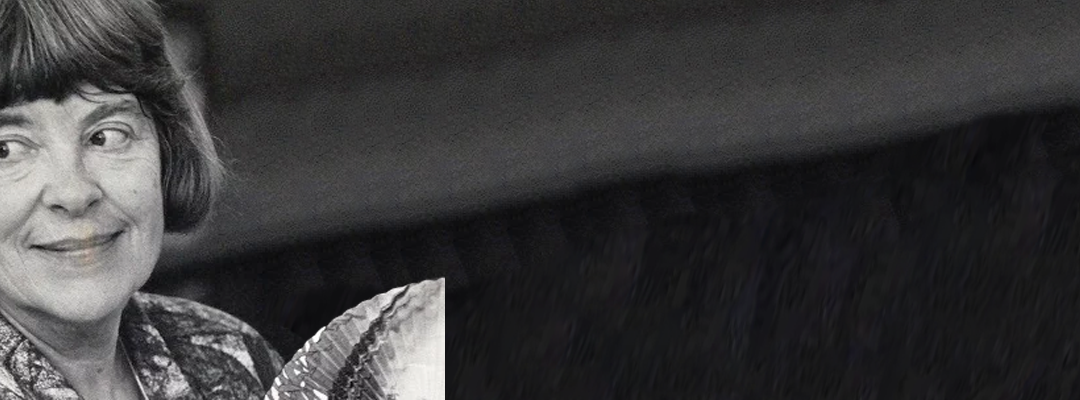Birkbeck and the Institute of English Studies come together for Appropriate Forms, a one-day conference celebrating the range of the late Barbara Hardy’s work, from the nineteenth-century novel to modernism, from Shakespeare to creative writing.
Barbara Hardy, scholar, critic, author and poet; one whose contribution within the literary landscape only continues to inspire.
“Known pre-eminently as a scholar of the 19th century, Barbara wrote widely on fiction, poetry and drama, from Shakespeare to modernism. Her creative writing was an intrinsic and continuous part of her work. […] Her refusal to bow to English academic conventions gave her an extraordinary intellectual independence. Apart from a period as professor at Royal Holloway College (1965-70), Barbara taught and researched at Birkbeck, as a lecturer from 1951, and then as professor until 1989. The college’s dedication to providing university education for students who had missed out on higher education proved an ideal fit for her socialist and egalitarian values.” (Isobel Armstrong, Appropriate Forms organiser, words via The Guardian)
Flore Janssen is a PhD candidate at Birkbeck, University of London researching women’s work, writing, and activism c. 1880-1920. Flore is also an Events Intern at the Centre for Nineteenth-Century Studies at Birkbeck, an institute that explores the long nineteenth century (ca. 1790-1914) and beyond through innovative research projects, conferences, seminar series and exhibitions.
Flore was kind enough to recount her experience and give us an insight into the day:
On 27 June, a group of distinguished scholars met at Senate House to celebrate the life and work of prolific and innovative literary scholar Professor Barbara Hardy (1924–2016). Appropriate Forms: A One-Day Conference in Honour of Barbara Hardy and her Work was hosted by the Institute of English Studies and the Birkbeck Centre for Nineteenth-Century Studies. The conference was organised by Isobel Armstrong and Hilary Fraser, two of Barbara’s successors in the Geoffrey Tillotson Chair of Nineteenth-Century Studies at Birkbeck.
Hilary opened the conference with a short account of Barbara’s significance for nineteenth-century studies, at Birkbeck and more widely. Isobel added a powerful reminder of Barbara’s importance as a prominent female academic bringing new ideas and practices to the academy and helping to prepare the way for other female scholars.
The conference programme reflected the variety of Barbara’s own work, which spanned from Shakespeare to the nineteenth century and included criticism and creative writing. Many of the speakers had strong connections to Barbara and had been influenced by her work: they included her former colleagues, students, personal friends, and admirers. The papers therefore offered a rich mix of detailed engagement with Barbara’s scholarship, new ideas and perspectives on Barbara’s work, and personal anecdotes. Barbara’s daughters and grandson, who were present, contributed some lively memories.
Each of the morning panels focused on specific topics that Barbara worked on extensively. Emma Clery, Janet Todd, and Isobel Armstrong explored Barbara’s work on Jane Austen; Isobel’s paper ‘The Shakespeare in Austen’, united two of Barbara’s great critical interests. Dame Gillian Beer and Josephine McDonagh built on Barbara’s observations on George Eliot with thought-provoking papers focusing on The Mill on the Floss and Daniel Deronda. Stephen Mooney and Russell Celyn Jones discussed Barbara’s inventive and practical engagement with creative writing. We even heard from Barbara herself in a video shown by Stephen, in which she discussed her poems in the volume Dante’s Ghosts (2013). The afternoon papers were wide-ranging, discussing Barbara’s work on Dickens, Eliot, Henry James, Shakespeare, and nineteenth-century poetry. Michael Slater and Steven Connor shared personal memories of Barbara as a reader, tutor, and thinker, from which a picture emerged of a strong and charismatic character who relished debate, play, and performance.
'A sponge soaking up fiction' – just one example of the numerous wonderful quotes from Barbara Hardy we're hearing at #AppropriateForms
— Birkbeck C19 Studies (@BirkbeckC19) June 27, 2017
The plenary, given by Professor Maud Ellman, explored the evacuation of children from British cities to the countryside in the Second World War in the context of psychoanalysis. From fascinating and shocking historical accounts of the analysis of evacuated children, she went on to offer a psychoanalytic reading of a short post-war story by Elizabeth Taylor.
The conference was brought to a close with three animated readings by Michael Slater. The texts were taken from Dickens and from Barbara’s own story ‘Edith Dombey and Son’, a creative response to Dickens’s Dombey and Son published in her short story collection Dorothea’s Daughter (2011). Hearing Barbara’s own voice, in a story that combined her insight into Dickens’s original text with her personal and creative response, provided a particularly ‘appropriate’ ending to a rich day.
Dind out more information on conferences we’re running or if you would like to be notified on future events sign up to our newsletter.



